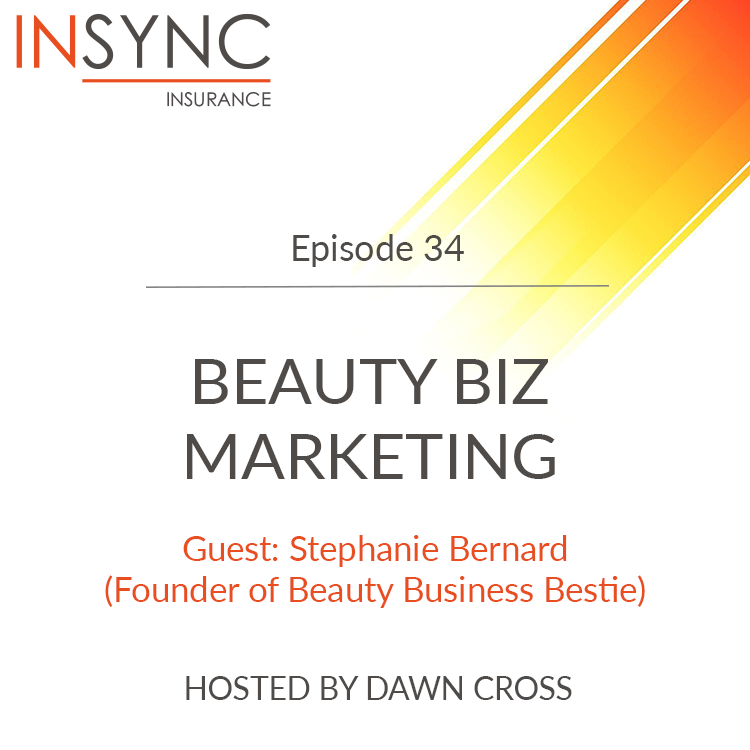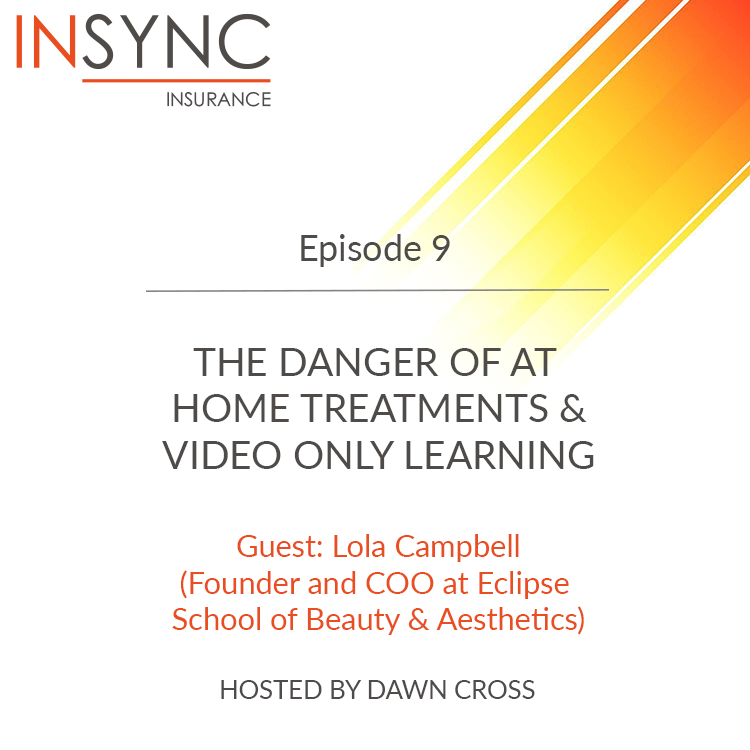Episode Transcript
[00:00:03] Speaker A: Welcome to the NSYNC Assurance podcast. I'm your host, Dawn Cross and today I'll be discussing the new community interest company, hair and beauty quality advisors with founder and practitioner, Sarah Tipple.
If you enjoy our podcast, make sure to leave a rating on your favourite podcast directory.
[00:00:20] Speaker B: Brilliant. Well, thank you so much for coming on. If I could get you to first introduce yourself and what you get back to you.
[00:00:26] Speaker C: So I'm Sarah Tipple. I've been in the hair and beauty industry for just over 25 years. So in that time I've owned salons, I've worked for other salons, I've become an educator, taught in colleges. I'm a quality assurer. So I go out to other academies and check the standards and the quality of their courses, stuff like that. And I'm also an external quality assurer for qualifier.
And at the moment we've got a small academy, privately funded academy in Colchester in Essex. And I also work with a company that has government funded contracts. So I'm head of division for hair, beauty and aesthetics for that company as well. So I pretty much get in and around the industry in terms of education, stuff like that, quite a bit. In the different job roles that I do, I basically cover.
You know, I could be in a centre up north one day and then down south or across in our own centre in the east of England another. So yeah, get to see quite a lot of what's going on in salons, in academies and in colleges.
[00:01:42] Speaker B: Oh, wow. So basically you're an absolute fox knowledge, hopefully.
[00:01:47] Speaker C: I do try to be. I like to keep up to date with what's going on. I don't like to be too far behind the curve.
But yeah, I would say that the majority of my job roles at the moment are all focused around education and more specifically the quality and compliance around the education packages.
[00:02:07] Speaker B: That sounds amazing. So today we are talking about this new company that's been set up, which is hair and beauty quality advisors, or HBQA for sure. Could you tell me a bit more about.
[00:02:22] Speaker C: Excuse me. So HBQA, or hair and beauty quality advisors started as a support group on Facebook.
It's grown into a larger community and we have turned it into a community interest company.
So for anybody that's not too up to date with the community interest companies, we're halfway between a limited company and a charity. So the aim of the actual organization is to support educators and people that are linked to education packages in hairdressing, beauty and aesthetic sectors.
And the community interest side of it means that the funds that we raise from memberships, from training and events and stuff like that that we do are put back into that community to help support educators and their associates, people that are linked to those education packages.
Over the years and over lots of my travels in the different job roles that I do, it's become quite apparent that there's a lot of focus and a lot of stress on improving standards.
We absolutely are here for that. We don't want that to change at all. We want to keep pushing for higher standards. But the educators that come into this sector are therapists or practitioners. They're not necessarily coming through an academic route. They're being asked to include additional paperwork. The qualifications are at higher levels. Sometimes people are struggling with the workload, time management. It could be that they're not particularly great with technology. That's one of the reasons they've come into a hands on job. Now they find themselves wanting to educate and raise those standards. Actually there isn't any support for them to be able to get to grips with those extra skills. There's no one for them to go to and kind of say, look in confidence. I'm struggling with this part of it because there's so many academies out there, they don't necessarily want to reach out to their network and let them know what support they need.
So HBQA has been designed to try and bridge that gap almost to bring the smaller academies in line with the kind of standardization and CPD that the larger academies and the FE colleges get.
And so we're going looking for funds and for grants and stuff like that to be able to bring some of the core training back to the educators. Things like English and math support, digital skills, stuff like that. To be able to support the educators so that they can then in turn support the learners to do better.
[00:05:17] Speaker B: That sounds amazing as well. And obviously depending on how they get into being an educator, there might just be like some small gaps that, like you said, some may not be the best with working with a computer, which, fair enough, not everyone's gig, but unfortunately everyday working now does probably include a computer of some kind. So to be able to kind of help people along with that sounds absolutely amazing.
[00:05:41] Speaker C: Yeah, I suppose I'll go back to my educator days. I don't tend to do so much. I deliver a lot of education around the actual education training. So the level five diploma in education assessors awards and stuff like that. But when I was teaching in the college, when I was teaching the treatment subjects in our own academy and we'd be working with partners and they'd say, okay, now you need to do this as well. And you kind of think, oh, okay, I've got to try and rework things and put that in what's the most efficient way to do it? And that doesn't always come naturally. Now I'm leading a division and I have my own academy.
I'm asking our tutors to do that. And all the while I'm thinking, I remember what this was like. And actually, this isn't just. You can't just keep asking for them to do more because that's what contracts require or that's what an awarding organization requires. We need to be able to show where that support is going to come from for the tutors and assessors and their associates to be able to actually fit that in. So hopefully, HBQA will be able to get that support where it's needed and help to raise the standards from, I'd say, this end of the academies, as opposed to the actual learner recruitment and the treatment side of things from the top end with the educators.
[00:07:17] Speaker B: No, that sounds brilliant. So how would it be beneficial for BT community? Obviously, you've kind of touched on this before, but is there any kind of main point if you haven't yet covered?
[00:07:28] Speaker C: Yeah. So, in terms of the beauty community, we speak to learners quite a lot, and very often what we find they're struggling with is confidence. So they're happy that the content that they got on their course was enough. They're happy that they know what they need to know to be able to go out and practice after training. But maybe the confidence isn't there because of the time frame in which they did their training or the amount of clients models they had to work on.
So we've obviously then gone back to the academies to do our research and say, what's going on, guys?
What's your version of this? And they're very often like, time restrictions, paperwork, the assignments. We're seeing a huge number of learners wanting to do level five aesthetic practice qualifications. The assignments take three and a half hours to mark, and that's, I would say, an average, but that's like the lower end of the times that we're coming in.
So it's quite demanding still for the tutors, and in order for them to be able to support the beauty industry, they just need to have some more efficient processes in place. So HBQA is there to deliver that CPD so the members can join. We've got an open group on Facebook where people can network and they can ask questions and other people from the group will be able to help them. But we also have a membership package where the members that sign up get access to CPD sessions that will help them with things like lesson planning.
It will help them with using different resources efficiently, marking tools and stuff like that. They get updates on the education sector. So not just hair and beauty, but what else is going on around. We get lots of people asking us about how else they can support their learners and we have dropping sessions where they can ask iqas questions so they can actually get that timely response to their questions. And what we're expecting is that this support for the educators then makes it faster and more efficient for them to be able to support the people in the sector. So when they come to do upskilling with somebody that's already qualified, that is going to be much more efficient because they're actually able to get that support on tap when they need it, rather than having to pay consultancy fees, that might be a barrier to them actually getting the support that they need, rather than them having to wait for the next time that one of their quality assurers comes in. They've almost got it on tap. So by supporting the educators, they will then be able to raise the standards, include more in their actual courses, the training sessions that the learners are there on site with them because the rest of it will be much more efficient and better supported.
[00:10:44] Speaker B: No, that sounds absolutely amazing. I think as well, I speak with many podcasts guests about it all and it's like it's always, especially within any industry, but especially with beauty and aesthetics, it's always good to keep improving on whether you're teaching or when you're actually practicing and doing treatments, it's always good to revise those skills and keep up to date because new stuff comes out all the time. So it's, I think the worst possible thing to be stagnating and getting nowhere and just think, oh yeah, what I'm doing is perfect, which is a bit crazy. Everybody does that because it's like, yeah, you are definitely not going to move with the times that were, especially as new things come out or new treatments, that sort of thing.
[00:11:27] Speaker C: Definitely.
And we need our educators to be keeping up to date with their treatments. But things like negotiating targets with learners or helping learners to stay motivated are still very important.
And by doing that and keeping your learners motivated and getting them to meet their targets actually helps the rest of their course run smoother. So then they aren't feeling behind, they aren't feeling stressed, they're not turning up to their next session feeling like they don't know what they need to know or they're not where they should be. And ultimately then the process is improved for everyone, which means by the time the learners leave and are certificated, hopefully they're that much more confident because actually everything's been done on target, on time and with support, rather than learners kind of doing their practical training up front and then potentially having six months while they try and get on top of the paperwork and they try and catch up. We're aware that life happens and it's hard for everybody in the cycle to make sure that they're on top of targets. But by being slightly more efficient with the paperwork, I would probably sum it up as paperwork.
We're hopefully going to be looking at learners doing their practical training and then getting out and using it much sooner, which will help to build their confidence and skills.
[00:12:58] Speaker A: Definitely.
[00:12:58] Speaker B: I think as well, seeing back to the kind of crux of it as well, is that if they're happy and they've had a really good training and they feel confident in the world, not only have you helped a great practitioner get out there and then obviously be safe out there, but obviously it means that you've done well within an academy, but also it means it's good feedback for the academy. More people are more likely to come to you if you've got good quality practices and people feel confident when they leave instead of feeling a bit unsure about whether or not they should start, maybe they need to do more practice, that sort of thing.
[00:13:31] Speaker C: Yeah, absolutely. I think the tutors, the assessors, they're human. They want to feel like they've got to the end of a session and they've also achieved and they've helped the learners to achieve, whether that's somebody new coming into the industry or whether that's somebody that has already got some skills and they need to transfer them into a regulated qualification or whether or not they've got some skills and they want to grow them.
We all want to see progress, we all want to see achievement.
And actually those days where it's hard to keep yourself motivated will make it naturally harder to keep your learners motivated. And by way of my job, I find myself quite regularly behind a computer looking at data, looking at marking work and stuff like that. And I often think to myself, I do miss just being out in the salon. I do miss that client contact.
So actually, when you put that into perspective, there's a whole lot of educators that are really fantastic practitioners that know so much about the industry. We can't lose those as educators because they're having too many days where they're feeling, oh, you know what I think I'd rather just be doing treatments, I'd rather just be working with clients because then we're going to lose that. We're going to lose that knowledge, we're going to lose that experience. And you can't pay for experience.
We need the experienced practitioners to be educating the newcomers, the people that want to upskill. So we are at risk of people being overwhelmed with the other side of training that the learners don't necessarily see, which is the paperwork and the systems and the processes, the audits and stuff like that, that happen.
And we don't want them to get to the point of overwhelm where we lose them as educators.
[00:15:35] Speaker B: Definitely. Is there anything else you'd like to add before we wrap up the episode?
[00:15:41] Speaker C: I think the main thing that we're kind of looking at at the moment is just making sure that educators know that there are places to go for support.
We are hoping to build our community. Of course we want to be able to put back into that community, but you've probably got contacts and networks that you can reach out to. Please do. Don't sit thinking, oh my God, this is too much. What have I done? Please reach out to somebody.
Let us support you. Let's all support each other and make sure that there's no judgment there. Everybody has those days. And you reach out and you preserve your motivation and you get that support so that we can keep you as the fantastic educators that you are.
[00:16:32] Speaker B: That's brilliant. Thank you so much for coming on today.
[00:16:35] Speaker C: Thank you for having me.
[00:16:38] Speaker A: Thank you to my guest today, Sarah Tipple and her benefits of HBQA. If you'd like to know more, visit HBQA Co UK or click the link in the description.
I have been your host, Don Cross, and tune in next week for another episode.
NSYNC is one of the UK's fastest growing insurance providers, offering comprehensive cover for SMEs and the self employed across the UK. Our expert team can tailor your insurance to meet your individual business needs and compare prices from alloys of engine approved partners. We offer a five star service and a principo platinum trusted winners five years in a row.





